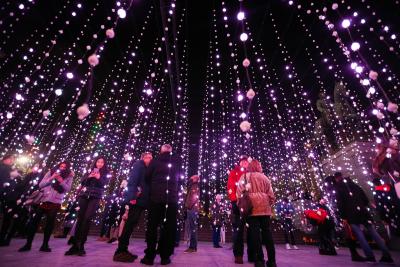
Brussels, Dec 25 (IANS) Amid the festive ambience of European cities adorned with lights and decorations, this Christmas season is underscored by heightened security measures.
The recent university shooting in the Czech Republic, adding to the previous shooting and stabbing in Belgium and France, respectively, has exacerbated security concerns, casting a shadow over the holiday cheer in the continent, Xinhua news agency reported.
Meanwhile, despite repeated warnings from security agencies, many tourists vowed these concerns will not impede their holiday plans. According to the travel analytics firm ForwardKeys, intra-European travel is exceeding 2022 levels, driven by sustained post-Covid demand.
“HUGE RISK”
A report from the United Kingdom (UK) National Counter Terrorism Security Office cited data from Western Europe, saying that terrorist attacks do not follow a discernible seasonal pattern. However, the Christmas period presents opportunities for attacks, not simply due to bustling celebrations but also because of its religious symbolism.
Authorities in Europe are on edge during this holiday season, given the recent rise in anti-Semitic and Islamophobic attacks since the conflicts in the Middle East escalated.
“With the war between Israel and Hamas and the polarization it causes in our society, with the upcoming holiday season, there is a huge risk of terrorist attacks in the European Union (EU),” European Commissioner for Home Affairs Ylva Johansson cautioned ahead of a meeting of EU home affairs ministers earlier this month.
Spain’s Home Affairs Minister Fernando Grande Marlaska, whose government holds the rotating Presidency of the Council of the EU from July to December, said, “In an especially delicate international context, the situation in the Middle East could sharpen tensions, heighten polarization and fuel terrorism.”
Their warnings came following security incidents in the bloc, including a radical Islamist fatally stabbing a German-Filipino tourist near the Eiffel Tower in Paris, France, on Dec. 2, and the arrest of two teenagers — one of whom called for a “holy war” against the West on social media — in Cologne, Germany, suspected of planning an attack on a Christmas market or synagogue.
In light of Europe’s history of terrorist attacks during the Christmas season, the security worries have a leg to stand on.
In 2016, a Tunisian male, reportedly pledging allegiance to the Islamic State of Iraq and the Levant (ISIL), drove a truck into a Berlin Christmas market, killing 12. In December 2018, a 29-year-old male armed with a firearm and a knife attacked the Christmas market in Strasbourg, France, killing five. The incident was later claimed by the ISIL. Austrian authorities thwarted an ISIL-inspired bomb attack on a Christmas market in Vienna in 2019.
ENHANCED SECURITY MEASURES
European security agencies have accentuated the growing risk posed by “lone wolves” – self-radicalized assailants with no formal ties to established extremist groups.
Thomas Haldenwang, president of Germany’s Federal Office for the Protection of the Constitution, cautioned that much of the safety threat arises from the potential for radicalized individuals to attempt attacks on “soft targets.”
In response to this heightened peril, the European countries have enacted various measures. EU Commissioner Johansson announced a financial boost, with the European Commission allocating an additional 30 million euros ($33 million) to enhance security in vulnerable areas, including places of worship.
Governments are intensifying the surveillance of extremists, a challenging task given the substantial number of individuals in Europe on terrorism watch lists.
German authorities, at both federal and state levels, are collaborating closely to identify potential threats early on while increasing police presence. Likewise, the French Vigipirate security alert system was elevated to the highest level, deploying increased security measures in public areas nationwide since mid-October.
Since the shooting in Brussels on October 16, where a perpetrator of Tunisian origin killed two Swedish soccer fans, Belgium has maintained a serious residual risk at threat level 3. Zeynep Balci, the spokesperson for Brussels Minister-President Rudi Vervoort, assured the public that the region is taking necessary measures to ensure safety as the New Year approaches.
This situation also prompted Swedish authorities to enhance intelligence gathering and adopt policies like a bag ban at major public events. The Swedish Police were bolstering their presence to improve readiness in case of an attack, Per Engstom, commander of the National Operations Department of the Swedish Police, said last month.
OPINIONS VARY
Speaking to Dutch-language newspaper Het Laatste Nieuws recently, Belgian terrorism expert Pieter Van Ostaeyen from KU Leuven University said avoiding all mass gatherings is a decision that has statistical reasons because crowds are more likely to be the target of attacks.
Van Ostaeyen urged people to “assess the situation realistically,” as it is impossible to check everyone at gatherings like those on New Year’s Eve.
Nevertheless, many take such cautions and alerts with a grain of salt.
Jared Ahmad, a journalism lecturer at the University of Sheffield, sees the Christmas security warnings as a familiar narrative that gains added significance this year due to concurrent events abroad, which are not worth making a fuss about.
“There’s been a risk … for a long time, even prior to the war on terror. If anything, the threat is the lowest it’s been in a long time,” he told Xinhua, adding “I think people should go about enjoying themselves.”
Since this will be the first Christmas and New Year holiday since the end of the global health emergency caused by Covid-19, many Europeans are reluctant to alter their holiday arrangements.
Holiday travels in the EU and Britain surged 22 per cent compared to last year. Moreover, arrivals in popular destinations, such as Italy, Austria and Sweden, have increased by over 25 per cent year-on-year, data from ForwardKeys showed.
Emphasizing her sense of safety, Anja Bilic, a resident of Croatia’s capital Zagreb, told Xinhua that her family will not make any adjustments to their holiday plans. “We are going skiing in Austria and I don’t see any security concerns.”
“Croatia is a safe country and I don’t expect Christmastime to bring security threats,” Dusan Ljustina, a theatre director in Zagreb, told Xinhua. “I am sure that the police and everyone else will maintain public order and peace and that there will be no incidents of any kind.”
–IANS
int/sha
